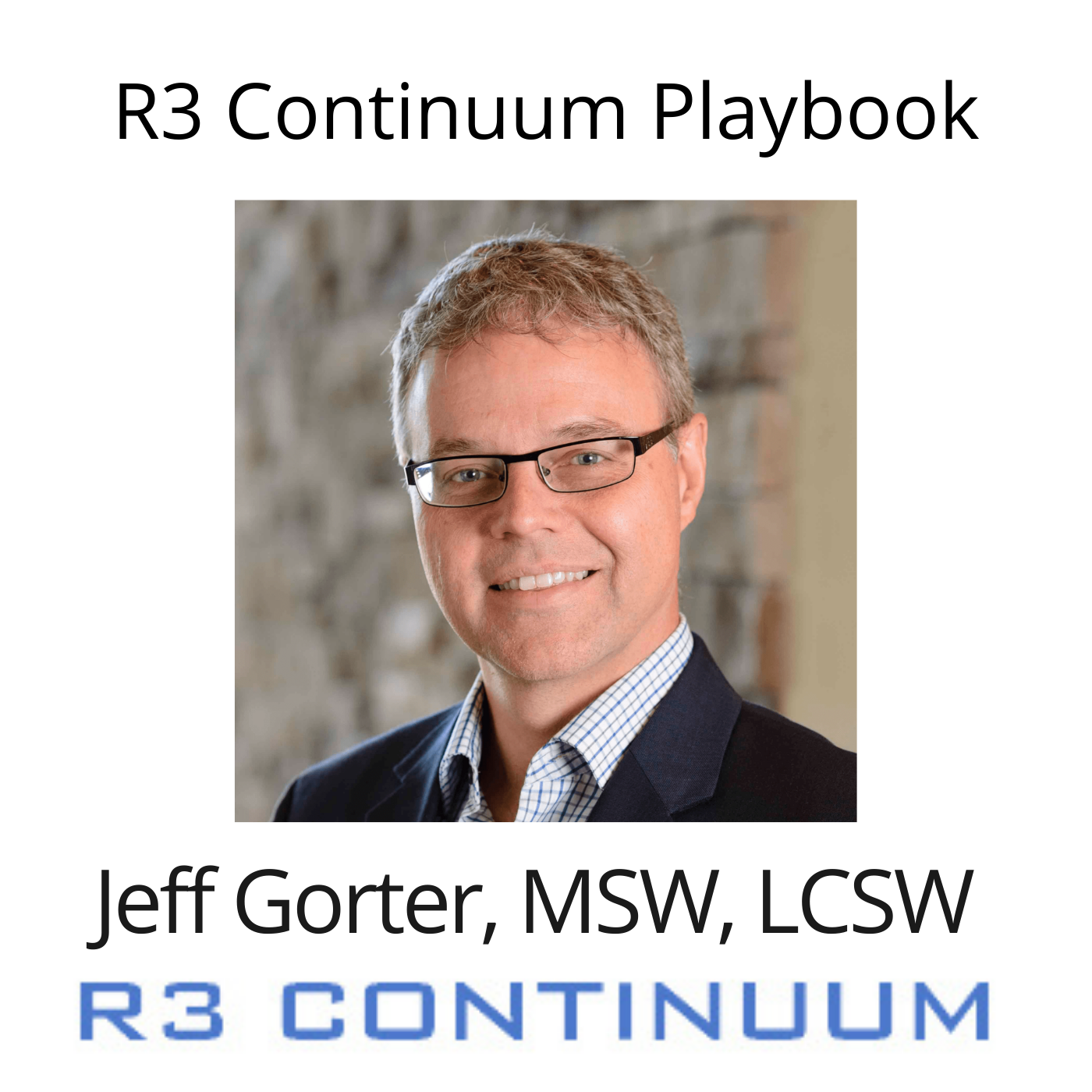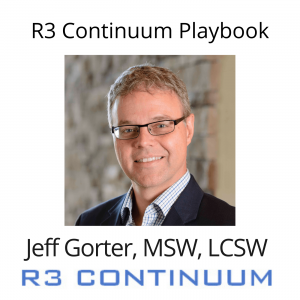

R3 Continuum Playbook: Managing Emotional Reactions to Reintegration
The reintegration process to the workplace will be welcomed by many employees but could be full of emotional reactions. Jeff Gorter, R3 Continuum’s Vice President of Clinical Crisis Response, addressed the emotional challenges that may arise and offers helpful strategies for leaders. The R3 Continuum Playbook is presented by R3 Continuum and is produced by the Minneapolis-St.Paul Studio of Business RadioX®. R3 Continuum is the underwriter of Workplace MVP, the show which celebrates heroes in the workplace.
TRANSCRIPT
Intro: [00:00:00] Broadcasting from the Business RadioX Studios, here is your R3 Continuum Playbook. Brought to you by Workplace MVP sponsor, R3 Continuum, a global leader in workplace behavioral health, crisis, and security solutions.
Jeff Gorter: [00:00:15] Hello. I’m Jeff Gorter, Vice President of Clinical Crisis Response at R3 Continuum. As the nation moves ever so slowly toward getting COVID-19 under control, many business leaders are looking ahead to the next stage of reintegration and return to work.
Jeff Gorter: [00:00:42] But as exciting as a return to some sense of normalcy is, it represents yet another change following a period of unprecedented and unexpected change. And change, as we all know, even positive change, can be stressful and presents with its own unique set of challenges. Here are three emotional reactions that business leaders should anticipate with their staff as well as themselves.
Jeff Gorter: [00:01:11] The first reaction is fatigue. So many of us have experienced a level of fatigue or weariness that is decidedly different from the type of fatigue we’ve experienced in the past following a full day of exertion at work. Zoom fatigue, which has become a common term, has been described by so many. But while virtual meetings have been literally a godsend and have allowed us to continue operations in ways we couldn’t have even imagined just a few years ago before this technology. But we all know it takes a different level of energy to make those kinds of meetings work.
Jeff Gorter: [00:01:51] In addition, many business leaders describe a type of decision fatigue. Feeling that their creative energies have been tapped out as they’ve had to make major business and personal challenges with very little reference and very little surety as to how they’ll work out in the future. Other leaders described compassion fatigue, knowing that their employees have experienced significant pain and loss over the course of this last year-and-a-half. And yet, as leaders, feeling ill-equipped to handle later how to respond to those particular needs.
Jeff Gorter: [00:02:29] The second expected emotional reaction is grief, not surprisingly. And grief tends to show up in two distinctly different ways. Tangible grief, which involves the direct loss of a family member, a friend, a co-worker, even a customer. This type of grief is the one most adults associate with a death or the end of a relationship. And in that regard, it’s completely understandable in the midst of a pandemic. The second variation, intangible grief is much more subtle, but in some ways is no less powerful for those who are experiencing it. Intangible grief involves the loss not of a person, but of a foundational concept, the sort of bedrock principles that held us up and made us feel secure.
Jeff Gorter: [00:03:22] For example, many of us have experienced a loss of the sense of safety that we had come to rely on and even take for granted prior to the advent of COVID-19. Many of us are grieving the familiar work patterns that used to structure our day and are now conducted virtually or in isolation. Many of us have experienced a grief surrounding increased financial challenges and pressures. A loss of connection to the community or to faith-based activities that formerly fed and sustained us. Many of us are grieving simply the way it was. And grief, whether tangible or intangible, takes time and emotional energy to heal and process.
Jeff Gorter: [00:04:11] Finally, the last emotional reaction business leaders can expect is anxiety, or to put it more precisely, anticipatory anxiety. Anxiety about what reintegration even looks like as that remains unclear and undefined at this point. Many experts expect a post-COVID ennui, that French term that describes a sense of listlessness, a lack of energy, and a proverbial asking, “Well, now what?” It stands to reason that as COVID has dominated our horizon for the last 16 months, it will not simply be a turning off of the switch and an immediate adjustment back to planning and motivating employees without COVID as the inescapable backdrop for everything we did.
Jeff Gorter: [00:05:02] Many employees are already reporting confusion along with the anxiety as to how unclear it is, what’s expected of me, what are the new roles, the new roles, the new interactions in my professional, my personal, and the social spheres in this brave new world that’s emerging.
Jeff Gorter: [00:05:25] Well, this is by no means an exhaustive list. These three emotional reactions, fatigue, grief, and anxiety can be expected during the reintegration and return to work period post-COVID-19. So, let’s look at some strategies that savvy business leaders have found helpful as they prepare themselves, their leadership teams, and their workforce for the next normal.
Jeff Gorter: [00:05:54] First, leaders need to entrench or foster connection once again. Encouraging work groups to re-establish some of the social and cultural norms, the little things which used to mark the workplace as best they can with reasonable adjustments. For example, is it safe to have a team lunch once again, face-to-face, all in a room? While we may not quite be there yet, it’s helpful to think about some adaptations we can do in the future to make that possible.
Jeff Gorter: [00:06:25] Such as, perhaps, having the lunch catered in rather than relying on the potluck that used to be a part of it. A catered in lunch is a safer alternative and it may enhance the comfort of those around. Now, while this example may sound simplistic or trivial, the little things can have an outsized power as your people are readjusting to this. Think about how much you’ve missed your work family over the last 16 months and how often you’ve longed for something, anything that involved other people and felt normal once again.
Jeff Gorter: [00:07:02] Second, it’s important for leaders to demonstrate and exercise patience as reintegration is a process, not a singular event. For many leaders, the phrase “Progress, not perfection” has become a guiding mantra. As in most things of life, your employees will return to work with a wide variety of attitudes and aptitudes with emotions and skills. And so, a leader wants to strike a balance between supportive understanding of where they are and what they’ve gone through and what they’re facing now. And performance expectations, because returning to work is an expression of functional resilience. Something that they want as well as the leader wants. So, we need to allow some time to readjust successfully.
Jeff Gorter: [00:07:54] Finally, effective leaders create space for the narrative to develop. That is, the story that will inevitably describe how we, as a company or as a work group, were impacted by COVID, how we managed through it, perhaps in spite of it, and where we are heading now as a group, as a collective. This sense of a story, a narrative with a beginning, middle, and end, is a natural and healthy way that all of us make sense of crisis events in our lives. The narrative allows us to begin to see this as an event in the past as a chapter in our lives that we’re able to close the book on as we once again look forward to the future.
Jeff Gorter: [00:08:42] Although this past year-and-a-half has been exhausting and painful, and while looking ahead may seem daunting to many business leaders, there are resources and consultation available to you. Our website, r3c.com, contains a number of articles that can be helpful in this process. And one particular service, our Telephonic Wellness Outreach, is an effective method to reconnect with your remote workforce ahead of time. Allowing you to gain an understanding of where they’re at and what their needs are, which allows you to provide resources in a strategic way that facilitates a return to work.
Jeff Gorter: [00:09:25] If you’d like to contact us, check out our website at www.r3c.com or email us at info@r3c.com. We’d be happy to have a discussion with you regarding any challenges that you may be facing. Thank you.
Show Underwriter
R3 Continuum (R3c) is a global leader in workplace behavioral health and security solutions. R3c helps ensure the psychological and physical safety of organizations and their people in today’s ever-changing and often unpredictable world. Through their continuum of tailored solutions, including evaluations, crisis response, executive optimization, protective services, and more, they help organizations maintain and cultivate a workplace of wellbeing so that their people can thrive. Learn more about R3c at www.r3c.com.
R3 Continuum is the underwriter of Workplace MVP, a show which celebrates the everyday heroes–Workplace Most Valuable Professionals–in human resources, risk management, security, business continuity, and the C-suite who resolutely labor for the well-being of employees in their care, readying the workplace for and planning responses to disruption.
Connect with R3 Continuum: Website | LinkedIn | Facebook | Twitter














